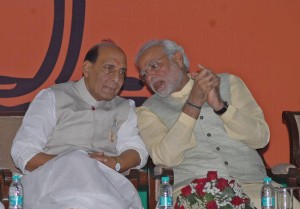Known for his “iron-fist” governance style, Prime Minister designate Narendra Modi is likely to have a smaller cabinet, which he could then monitor closely, say those aware of his working style.
As hectic parleys go on over portfolio distributions, a BJP leader close to the Gujarat chief minister pointed out that it has been clear since campaign days that Modi’s cabinet will be smaller.
“He has always said ‘minimum government, maximum governance’, that is the clearest indicator that his cabinet will not be big,” the senior BJP leader, speaking on condition of anonymity, said.
A thumping majority with 282 seats for BJP also means there will be no ally pressure for ministerial berths, points out another party leader.
Saurabh Patel, a minister in Modi-led Gujarat government, who is known to be close to Modi, said the BJP leader’s style is of setting up systems and taking complete responsibility.
“It is always pleasant working with such a dynamic leader. He believes in taking complete responsibility,” Patel said over phone from Gandhinagar in Gujarat.
“He forms a system, makes transparent policies and ensures that everything is within a framework. It is this discipline that is his speciality,” said the Gujarat minister who holds a number of portfolios including energy, finance, industries, petrochemicals, minerals and civil aviation.
Modi “trusts the people he works with”, and has the capability of “getting the best out of people”, noted Patel. “He is not known to give any special favours,” he added.
Another BJP leader, who did not want to be named, said Modi would keep a close watch on the key ministries.
“A smaller cabinet, and more control, is what is expected… It is Modi’s governance model. He would have his eye on all ministries,” said the party leader.
He also pointed out that former prime minister Atal Bihari Vajpayee monitored all ministries closely.
Patel meanwhile said that it would be wrong to say that Modi keeps a “watch” over all departments, and insisted he “reviewed key programmes and policies from time to time”.
Dinesh Shukla, senior political analyst and former professor of political science at Gujarat University, who also taught Modi in the university, however said that Modi’s “one-man show” style of functioning may not work in Delhi.
“In Gujarat it was a one-man show for Modi, but in Delhi, the situation will be different. It will be difficult to function that way, he will need to change his style a bit,” Shukla said.
Modi did masters in political science from the Gujarat University in 1983.
“He will have to take everyone along, and it seems at the moment that he is taking everyone along. Whatever will be the situation, it will be clear in a day or two,” Shukla said.
“Modi is a seasoned politician, he can adjust well,” he added.
While the BJP remains tight-lipped over the distribution of portfolios, informed sources have indicated that party leaders like Rajnath Singh, Sushma Swaraj, Arun Jaitley, and Nitin Gadkari are likely to get some key ministries.
The sources said Rajnath wants home portfolio. However, there is also a possibility that he may continue to be the party president.
Sushma Swaraj, who was keen for one of the top four ministeries, may have to settle for something else.
Arun Jaitley as well as Arun Shourie now seem to be in contention for the key finance ministry.
Amit Shah, Modi’s close aide, will most likely become minister of state in the Prime Minister’s Office (PMO), becoming Modi’s eyes and ears in the government.
The sources however add that all the infrastructure ministries may be brought under one umbrella so that Modi could keep a close watch on it.
For party veteran L.K. Advani, the role of Lok Sabha speaker seems to have been agreed on, while Murli Manohar Joshi may get some other post, like deputy chairman of planning commission, said these sources who also added that finally everything depended on one man and his thinking – Modi.
